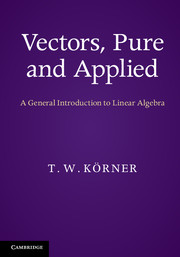Book contents
- Frontmatter
- Contents
- Introduction
- PART I FAMILIAR VECTOR SPACES
- 1 Gaussian elimination
- 2 A little geometry
- 3 The algebra of square matrices
- 4 The secret life of determinants
- 5 Abstract vector spaces
- 6 Linear maps from Fn to itself
- 7 Distance preserving linear maps
- 8 Diagonalisation for orthonormal bases
- 9 Cartesian tensors
- 10 More on tensors
- PART II GENERAL VECTOR SPACES
- References
- Index
9 - Cartesian tensors
Published online by Cambridge University Press: 05 January 2013
- Frontmatter
- Contents
- Introduction
- PART I FAMILIAR VECTOR SPACES
- 1 Gaussian elimination
- 2 A little geometry
- 3 The algebra of square matrices
- 4 The secret life of determinants
- 5 Abstract vector spaces
- 6 Linear maps from Fn to itself
- 7 Distance preserving linear maps
- 8 Diagonalisation for orthonormal bases
- 9 Cartesian tensors
- 10 More on tensors
- PART II GENERAL VECTOR SPACES
- References
- Index
Summary
Physical vectors
When we discussed the use of vectors in geometry, I did not set up the axioms of geometry, but appealed to the reader's knowledge and intuition concerning planes and lines. It is useful and instructive to see how Euclidean geometry can be developed from axioms, but it would have taken us far away from our main topic.
In the next two chapters we shall develop the idea of a Cartesian tensor. Cartesian tensors are mainly used in physics, so we shall encounter ‘point masses’, ‘smoothly varying functions of position’ and similar slightly louche characters. In addition, matters which would be made explicit by a pure mathematician will be allowed to remain implicit. Repeated trials have shown that it is rarely useful or instructive to try to develop physics from axioms and it seems foolish to expound a theory in a different language to that spoken by its users.
If the reader is unwilling to adopt a less rigorous approach than that used elsewhere in this book, she may simply omit these chapters which will not be used later. She should, however, recall that
… a well-schooled man is one who searches for that degree of precision in each kind of study which the nature of the subject at hand admits.
(Aristotle Nicomachean Ethics [2])Unless otherwise explicitly stated, we will work in the three dimensional space ℝ3 with the standard inner product and use the summation convention.
- Type
- Chapter
- Information
- Vectors, Pure and AppliedA General Introduction to Linear Algebra, pp. 211 - 232Publisher: Cambridge University PressPrint publication year: 2012



